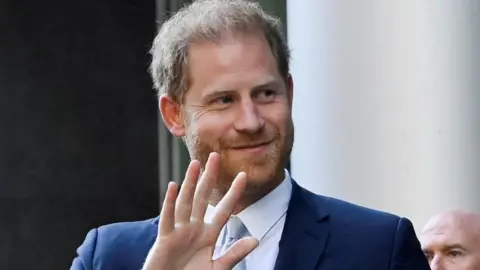Prince Harry set for court showdown with The Sun publisher
 Reuters
ReutersThe Duke of Sussex is to take The Sun's publisher to court over claims it used illegal methods to gather information on him.
Prince Harry's case could go to trial in the High Court next year after a judge ruled on Thursday that parts of his claim can proceed.
While his allegations of some illegal methods will go to trial, a judge dismissed his phone-hacking claims.
News Group Newspapers (NGN) has denied Harry's allegations.
Prince Harry has alleged that journalists and private investigators working for The Sun and now-defunct News of the World used unlawful methods to obtain information about him.
The latest round of the royal's battle with the UK tabloid press revolved around at what point Harry knew enough about the alleged methods used against him in order to sue.
Under the law, claimants have six years after a privacy breach in which to take action.
Lawyers for NGN have argued that he waited too long to bring the claim, and said it should therefore be dismissed.
But the court previously heard Harry claim there was a "secret agreement" between Buckingham Palace and NGN which had prevented him from taking legal action sooner.
In March 2023, Harry disclosed for the first time a supposed deal between royal aides and senior NGN executives, which stipulated any privacy actions against the company should be delayed, and then settled out of court.
He relied on this context to explain why he had not brought his claim years earlier.
Lawyers for NGN have previously disputed the existence of any secret agreement, describing it as "Alice in Wonderland stuff".
Mr Justice Fancourt said Harry's amended case submitted earlier this year - which was reliant on the existence of the "secret agreement" - did not "reach the necessary threshold of plausibility and cogency".
He said emails between the Palace and NGN suggested there was "at some time an understanding" that the Royal Family's claims "would be addressed informally" at a late date, but the "vague and limited" evidence provided by Harry's lawyers did not amount to proof of Harry's specific claims.
From 2012, the judge ruled, Harry was "on notice" that he may have been hacked after finding out about the practice at the News of the World.
The judge said Harry "could easily" have had his lawyers investigate further, at which point a "much fuller picture would have emerged". The judge said the phone-hacking claim was therefore too late.
A spokesperson for NGN called the ruling a "significant victory" for the company.
They said: "The judge, Mr Justice Fancourt, found his claims in relation to the alleged 'secret agreement' were not plausible or credible.
 Reuters
Reuters"It is quite clear there was never any such agreement and it is only the Duke who has ever asserted there was."
But the judge ruled that there should be a trial around other alleged methods used to get information about Harry, identified in the ruling as "blagging of confidential information from third parties, and instructing private investigators to do these or other unlawful acts".
The judge said Harry had a "realistically arguable" case that he did not know enough about any use of the methods back in September 2013, the point at which NGN argue that his six-year window to bring a claim began.
Harry says he did not have enough information to bring a claim until 2018.
Thursday's ruling does not take a position on whether Harry waited too long to bring a valid claim, only that "it is not sufficiently clear at this stage that it was issued too late" and should be decided at trial.
The trial could feature "many other" claimants, including actor Hugh Grant, and is due to start in January 2024, although could run into 2025.
Harry's legal action against the Sun is one of three major claims he is making against the publishers of British tabloids.
He gave unprecedented testimony in court last month as part of his claim against the Mirror Group, and is also attempting to sue the Daily Mail and Mail on Sunday over alleged breaches of privacy.
